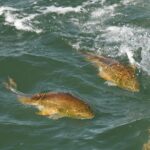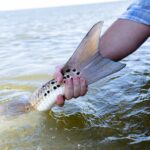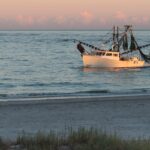
A Veteran Guide’s View of Jacks
If you’ve spent any time on the water in South Florida, chances are you’ve heard
Feature Photo: Rex Messing
Monday, August 7, 2023
This afternoon the ASGA team was briefed by NOAA officials that the Fisheries Effort Survey has been overestimating recreational fishing effort. Our current understanding is that this overestimation is around 30-40%, as was discovered in a recent pilot study to evaluate potential survey bias. NOAA plans to initiate further studies in 2024 to validate this information.
NOAA Fisheries’ Marine Recreational Information Program (MRIP) implements a national network of recreational fishing surveys. The Fishing Effort Survey gathers information about the number of trips anglers take. This data is an integral part of stock assessments, harvest numbers, and recreational discards.
The news of this significant overestimation has serious implications for all of our fisheries. Since every species is managed differently, the ramifications of this information can not be quantified under a singular umbrella. It does not mean that because fishing effort is less than originally expected, there must be more fish to harvest. In fact, it will mean there needs to be a major re-calibration because effort is used to help determine stock size. If we have overestimated effort, we also overestimated the stock. We must go species by species to understand the best path for management moving forward. Now more than ever, we need to be precautionary in our management approach.
The impact of this update is significant, maybe more than most will initially understand. As always, the ASGA team will be thoughtful in our approach to understanding the new state of management and transparent in our communication as we go down this new road together.
Science has been and will always be a process. Our ethos remains that fisheries should be managed based on the best available science, and if the science can be better, we should work to improve it. We must learn from this and move forward with better data to make more informed management decisions for our fisheries.
This news is disheartening. ASGA voiced concerns about fishing effort estimates and offered to help improve the information in the past. ASGA is participating with NOAA at the highest levels to ensure that we move forward in a manner that allows for true collaboration with the recreational community.
We will not shy away from these obstacles – and neither should you. We will continue on this journey together. Our members and future generations of anglers are relying on our leadership and unwavering commitment to abundant fisheries.
Trials like these create opportunities for growth. While the short-term outlook is less than rosy, we have a chance to make huge improvements in the next few years. We will update you as more information becomes available. While we can’t genuinely provide “next steps” at this time, you should expect a chaotic landscape in fisheries management in the near future.
Click the following link to access the complete pilot study summary:
“Evaluating Measurement Error in the MRIP Fishing Effort Survey”

If you’ve spent any time on the water in South Florida, chances are you’ve heard

Photo Credit: Graham Tayloe Big Win for Redfish in Alabama Huge news from the Marine

Feature Photo: Carter Abramson | Simms Fishing at the Fisheries Science Symposium We have more

Each year, hundreds of millions of fish are killed as collateral damage from large-scale, inshore
We rely on our members and donations to keep fighting for a sustainable tomorrow in marine conservation.
GIVE THE GIFT OF FISHERIES CONSERVATION THIS HOLIDAY SEASON. SHOP ASGA GOODS THAT FUND FISHERIES RESEARCH & ADVOCACY CAMPAIGNS
JOIN ASGA IN CALLING FOR CRITICAL MANAGEMENT ACTION AFTER YEARS OF SPAWN FAILURES & POOR MANAGEMENT.
By using this website, you agree to our use of cookies. We use cookies to provide you with a great experience and to help our website run effectively. To learn more, please review our privacy policy.
6 Responses
Thank you, for never giving up.
If you are going to be dumb, you gotta be tough…. That’s our theme song.
I’ve been fishing in NC for almost 65 years. I’ve seen the demise of almost every salt water species we could keep at one time. States on either side of us have reasonable season long limits that are working , based on scientific input, but in NC we are still being controlled by an archaic system of political nepotism. What you have sent us is just one more example of how we as tax-paying sportsman continue to be
screwed.
Amen
One of my favorite quotes: “If you are here without data then you are just another person with an opinion”.
Any meaningful action to save stripers needs to be based on solid scientific decisions.
One of the pillars of good science is sound data. Thank you for working to ensure the data being gathered is just that.